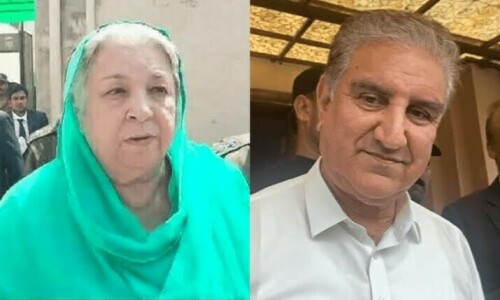KARACHI: Maulvi Abdul Haq will always be synonymous with the movement for the propagation of the Urdu language. Under his aegis, global literature was extensively translated. The Anjuman Taraqqi-i-Urdu played a decisive part in the creation of Pakistan. These thoughts were expressed by some prominent literati on the 53rd death anniversary of Maulvi Abdul Haq on Saturday morning.
Held on the premises of the Anjuman in Gulshan-i-Iqbal, several speakers waxed lyrical about Baba-i-Urdu’s achievements and urged the audience to begin the movement anew. The keynote address by Dr Zafar Iqbal, vice chancellor of the Federal Urdu University of Arts, Science and Technology, was focused on recruiting youngsters for the promotion of the Urdu language. He was also critical of politicians who sought to give the status of the national language to regional languages.
“Baba-i-Urdu was not just a name, he was a movement. Other than Maulvi Abdul Haq, this can only be said of Sir Syed Ahmed Khan. Imagine an aged man of 70-75 years travelling for hours on whatever means of transport available to him whether it was in a horse-drawn carriage, a train or even on foot. Traversing to every nook and cranny of undivided India to establish offices of the Anjuman, he set up schools and convinced people to converse in Urdu and work for the language. In my opinion, these efforts by this one man are indicative of a movement,” he said.
“However, soon after his death the movement was sabotaged by the bureaucracy. It was responsible for the derailing of the movement. And sadly, the Anjuman, which Maulvi Abdul Haq developed more than 50 years ago, has now turned into a printing machine generating just tomes upon tomes in Urdu.”
Commenting on the recent move by the National Assembly’s Standing Committee on Law and Justice that sought the status of the national language for regional languages, he said: “I was invited by the committee to give my remarks. I told them that they had to decide on a main language (markazi zuban) for the country. One of the bases of a country’s creation or for that matter its disintegration is language as witnessed in the case of East Pakistan, now Bangladesh. The members had no choice but to reject the move.” He added: “Urdu has to become the lingua franca of offices and schools. Propagation of Urdu has to be revived in the form of a movement and one must be ready to undertake hardships for its cause as demonstrated by Baba-i-Urdu.”
As president of the Anjuman, he announced the opening of the membership to Urdu devotees particularly inviting youngsters.
“For the past 50 years the Anjuman membership has been closed. No new member has been elected. But now anyone who has an affinity for the language can become a member. We will officially issue a notification on the matter. New members will bring in new ideas and new thinking. We should not be afraid of new blood. They should be welcomed.”
Translations of global literature into Urdu by Maulvi Abdul Haq and a personal connection with Baba-i-Urdu were salient points of Professor Sahar Ansari’s brief speech. “Under his patronage, Akhtar Hussain Raipuri translated The Good Earth by Pearl S. Buck and My Childhood by Maxim Gorky.”
“I belong to Aurangabad where Baba-i-Urdu opened a branch of the Anjuman. My khaloo, Professor Ghulam Tayyab, was his contemporary and that is how I got to know Maulvi Abdul Haq. Moreover, my brother-in-law, Professor Fasihuzzaman Qureshi, taught economics at the Urdu college since its inception,” said the eminent writer.
Firasat Rizvi, a versifier of Rubaiyat, read out an extensive paper on the Anjuman’s role in the creation of Pakistan. “Very few people are aware that Maulvi Abdul Haq was the architect of the extensive resolution on Urdu passed during the 27th annual All India Muslim League session held on Oct 15, 1937 in Lucknow. This has been mentioned in two places. One in the memoirs of Mian Nashir and the other in Aik Bhasha, Do Likhawat, Do Adab by Gyan Chand. In the latter book, the author provides sufficient evidence to prove that the Anjuman played a role in the creation of Pakistan.”
Further highlighting Maulvi Abdul Haq’s achievements, Mr Rizvi said that he started a quarterly magazine in 1921 from Aurangabad that included articles relating to Urdu literature and linguistic issues.
Dr Javed Manzar, an official (naib mutamid aizazi), of the Anjuman in his introductory remarks said that Baba-i-Urdu’s death anniversary was a reminder of a great loss to the Urdu language. It was only because of his untiring efforts that the Anjuman became an influential educational institution in undivided India, he said. “Even though he is no longer in the world, his work will always live because of the Anjuman.”
Published in Dawn, Aug 10th, 2014











































